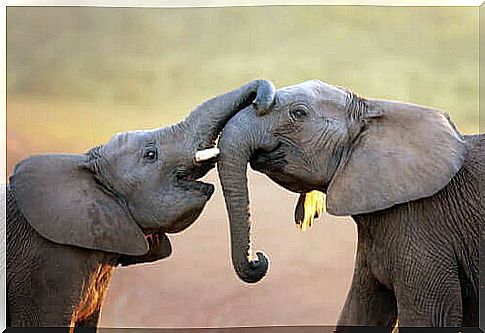Do Animals Have Feelings?

Any guardian of a dog or cat would not hesitate to state that their pet has feelings. Every animal (at least birds and mammals) has a different personality, and this has been confirmed by science on different occasions. Things get a little more complicated when it comes to nature’s emotions and feelings, as these are difficult attributes to quantify.
As philosophical as the subject may be, researchers around the world never tire of trying to answer this question. Do you want to find out what is known about feelings in the animal world? Here we will show you.
Feelings and emotions: not the same thing
Feeling refers to both mood and emotion. Emotions are faster, are treated as psychophysiological reactions resulting from certain stimuli perceived by an object, person, place or relevant event. There are more differences between the two terms:
- Emotions are transient and quick, while feelings remain in time.
- Emotions are unconscious emotional changes, as they do not require prior reasoning.
- A feeling cannot be conceived without a prior emotion. For example, the same emotion can lead to different feelings.
Emotions seem to be, in part, an evolutionary mechanism, as they can be very helpful in challenges posed by nature. Some are basic, like fear, anger, disgust, joy, sadness, and surprise, and they have a clear innate component. The rest of the emotions are complex and may have more difficult purposes to decipher.

Do animals have feelings?
Once both terms have been elucidated, it is more correct to associate animal moods with emotions and not with feelings. Even so, they are difficult to identify, as we see their expression in the animal’s actions, not the emotion itself.
Even so, ethological studies like this one have tried to demonstrate the presence of simple and complex emotions in many animals:
- Possible cognitive emotional manifestations were monitored in a sample of bees submitted to an anxiety state.
- Some were stirred inside their honeycomb before being introduced to a string of scents, both new and familiar.
- Other bees remained calm in their habitats and were later introduced to these odors.
- It was observed that bees subjected to anxiety ventured much less in approaching unfamiliar smells.
This fact can be explained by an emotion as basic as fear. After a traumatic experience, these animals may have more emotional reserve in the face of new stimuli.
The Emotions of Mammals
Things get even more complicated when we move into the brain complexity of the study subjects, as several complex emotions were recorded in mammals. Here are some examples:
- Several studies have shown that primates are able to demonstrate empathy. For example, in several cases in laboratories, monkeys refused to obtain food by pulling a lever if it would cause an electrical shock to a companion.
- Many theories propose that dogs are capable of perceiving negative emotions in the same way as humans. It is known that dogs can present some psychological pathologies, such as chronic depression and neurosis.
- Elephants have cognitive memory and show empathy for the suffering of others of their species.
As we can see, the development of ethology in recent decades seems to indicate that humans are not the only ones capable of feeling in the animal world. In addition to basic emotions, these facts demonstrate that concepts such as empathy or complex emotional disturbances are also present in animals.

an open debate
Despite this scientific evidence, there are critics who do not agree with the concept of emotions in the animal world, arguing that studies and interpretations are always approached from a biased anthropomorphic view.
In short, many of these debates reside in the very differentiation of complex concepts such as emotions and feelings. Can animals feel? Why shouldn’t they, if emotional biases were noted in them? Are the cognitive abilities of a mammal comparable to ours? All of these questions have different answers depending on the level of understanding we give the animals.









